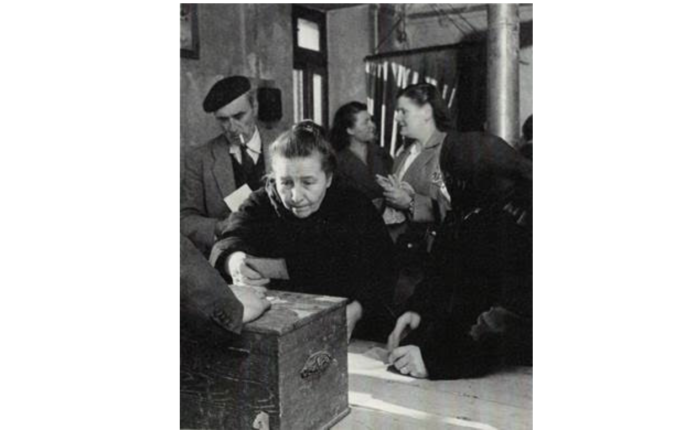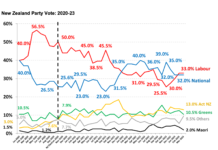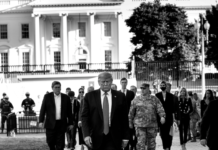IS DEMOCRACY still the guiding force of New Zealand society? In how many institutions do democratic principles still inform decision-making? Do those who wield power in our society even believe in democracy anymore? What does it mean that, over the course of the last 40 years, democratic principles have largely ceased to inspire the conduct of public affairs? When even our political parties no longer take democracy seriously, can we really call ourselves a democratic nation state?
One approach to these questions is to ask ourselves if we are invited to practice democracy in our daily lives. If we are workers, do we get to participate in the decisions of the organisations that employ us? If we are students, do we have any say in the content and structure of our courses? If we are unemployed, or beneficiaries, do we have any rights at all that we are able to enforce? And, if the answers to all these questions is an emphatic “No!”, then, once again, are we truly entitled to characterise the institutions in which we spend most of our waking hours, and/or upon which we rely for our daily bread – democratic?
These are very modern questions. True, participatory, democracy has not been a feature of human existence since the species ceased to operate in small groups of hunter-gatherers and allowed itself to be caught up in the hierarchies of “civilisation” – the city-based cultures made possible by the surpluses of the agricultural revolution.
For most of the past 10,000 years the very idea of democracy – of everybody having a say in the running of things – would have been laughable. That was not the way the world worked. Slaves, peasant-farmers and women: the people who kept society going, had no say whatsoever. And even in those rare city-states where “freemen” managed to carve out a political role, democracy proved to be a fragile flower. For most of human history, tyrannies, monarchies and empires have been the norm.
The idea that all human-beings might have a role to play in the governing of a civilised society is only about 300 years old.
Ironically, democracy as a “modern” idea owes much to the encounters of European settlers with the indigenous hunter-gatherer and/or proto-agricultural peoples living in the lands they had “discovered”. The freedom enjoyed by the ordinary members of these societies contrasted sharply with the downtrodden condition of the ordinary people of Europe.
As the French philosopher Jean-Jacques Rousseau (1712-1778) famously declared: “Man is born free, and everywhere [by which he meant Europe] he is in chains.” The Great Question was thus posed: Can human-beings be both “civilised” and “free”? Throughout the Nineteenth Century, the answer was a confident and optimistic “Yes.” The bloody Twentieth Century, however, vacillated crazily between “Yes” and “No”. So far, the Twenty-First Century’s response seems to be: “What do you mean by ‘civilised’?” and “What do you mean by ‘free’?”
We should not be deceived by this “post-modern” response to The Great Question. It is nothing more than ruling-class temporising. The infamous “One Percent” have already decided that freedom and civilisation are even less compatible today than in the past. They just don’t want to admit it to the Ninety-Nine Percent.
If you would see how free we are, go out into the streets and count the number of human-beings peering into tiny screens, ear-buds inserted, listening to their Master’s voice.
And what is their Master is saying? His message is a simple one: Look inwards for the truth. Trust only your own experience. Who you are cannot be defined by anybody else. Refuse to be distracted from the self you have made. There is nobody like you. Your morals and values are your own. You don’t owe anything to anyone else. Solidarity is death. Hell is other people.
Democracy contradicts every one of those propositions: it commands us to look outward; it demands our trust; it tells us what is expected of our humanity; it elevates the collective above the self; it celebrates the things we have in common; it defines our morals and values; it calculates what we owe one another; it discovers life in solidarity; and it finds heaven in, and with, other people.
Set forth in this fashion, the problems associated with democracy immediately become apparent. Who wants to be a democrat if it means giving up the self-absorbed existence which the material abundance of Twenty-First Century capitalism makes possible? And don’t put too much faith in George Orwell’s plaintiff cry that: “If there is hope … it lies in the Proles”. They want the good life, too!
In a curious way, our self-centred, hyper-technologised, post-modern existence closes the circle on democracy. Originally, in our species’ hunter-gatherer mode, all discussion and debate was focused on the practicalities and purposes of survival. The business of being human was the business of staying alive for another day. Ten-thousand years later, it still is. The only difference, now, is that we believe we can do it on our own.
Democracy will flourish again only after we discover that we can’t.





I think importing hordes of people from low trust societies will make it better, though. Infinitely so.
The Rough Beast. I’ve often wondered why this country doesn’t import more Danes or Dutch or Western Europeans generally, and if you’re saying that we prefer citizens from traditionally corrupt and corruptible slippery Asian societies, you’re right. It’s very short term thinking, but that’s how current politicians are. The seasonal import of Pacifica is a separate and probably more pragmatic issue. At everyday level, strangers come here and then complain that we don’t adapt ourselves to accommodate their cultural differences, which can be quite a big ask. Politicians are immune from the practicalities of just about everything.
It’s not that we don’t import Danes, Dutch or West Europeans, it’s that they don’t really want to come. Why would you travel to the other side of the world, to earn less money and pay more for the privelege? You’ve already got democracy, higher living standards, and better infrastructure at home!
If you’re coming from an asian society however, with impartial/no democracy, corrupt government, low living standards and wages… then NZ looks pretty good! Also, it’s closer. If you don’t like it, it’s a lot quicker to get home!
Holland and Denmark have higher standards of living so why would they want to come to a 2nd world country?
‘Second World’ is spot-on. We’ve fallen heavily over the past 4 decades.
Our only hope is that we are part of the process every three years. In this case to hopefully undo a whole lot of undemocratic shit that is going on.
The book I read tells us we can’t do it on our own as well although it offers a vastly better future.
“ All it takes for evil to prosper is for good men to remain silent “
I cringe when I hear adults say they’re not interested in politics. What did we get in the last Auckland local elections? Thirty something percent turnout?
I’ll end with Pericles: “You may not be interested in politics …but politics is interested in you”
We seem well on the way to establishing a feudal society where those at the top, the developing rentier class owe their position and future wealth to their ancestry and the belief that they deserve special status because they arrived here first. Tamati Coffey may call it “tweaking” democracy, but it is more a full scale assault on democratic principles developed over millennia by Western civilization.
WE vote because we must, not because there is anything to vote for. We vote for the smaller pile of shite, the less stinky pile of shit, the less runny shite pile of shite, and in the end it does not matter, cause we are all getting buried under a never endling hosing down with shite. Thanks Labour. Thanks National. Thanks the Green. Thanks TPM. Thanks ACT. YOU are ALL Piles of Shite!
Look at the housing crisis. Was already a crisis in 90’s -, came WFF, Accom Benefit under Aunty Helen, did that help? No. N kept that mental wankery alive cause hey, Housing crisis. Jacinda Ardern, dropped the ball altogether, we now have families live in one bedroom motel units (which is illegal on all grounds – commercial residences are not for long term residential habitat – at least the bylaw at Fenton street n in Rotorua states so) to the point were they just break into empty KO houses that will have to be ‘meth tested’, and then suddenly oops we found a house. That was in the news yesterday and the day before.
So honestly we get to choose between fuckery, total fuckery and absolute fuckery. This labor government has provided us – US who are not beneficiaries, who are not NGO/Charity/Government workers working from home, US who are not working callcentres for some big business, but who actually build, cook, clean, look after, educate, heal, and who leave the house – with nothing more then abject wankery and performative care and bullshittery. And US – the unwashed masses – we know that there will be no difference between any of the other players. I see no difference between N and L. They are both no good for this country and both parties are no longer fit for purpose.
We are living in the times of Anarcho Tyranny – and when people have enough of ramraids, break ins, children with broken bodies and minds, children without their sexual organs and reproductive function, with people being made transient by policy, hunger, failing education, healthcare that is nothing more then a mockery of the taxpayer that funds it and depends on it, that empty space will be filled by someone who will pretend to fix it. When that day comes ,the current wankers will be on a boat somewhere overseas or be part of that ‘new regime’.
Comment of the day, the week, the month, the year!!!!!
As a recently retired person who did stuff that matters I am personally afraid for my future.
I see NZ as a country of lawless ignorant children who rightly see violence as their only life option. Thanks neoliberalism for nothing!!!
Thanks Jacinda Ardern and the Labour Government.
Yep, thank’s for making our lives so much better.
Thanks for explaining that Chris. Your comment yesterday had me scratching my head.
“Democracy will flourish again only after we discover that we can’t”.
I think technology, identarianism and greed have a lot to do with how we got here and more widely the downfall of religion.
We once believed in some universal rules for living but we let it all go and replaced it with the hell that is individualism. A concept blatantly promoted by a global capitalist system that seeks to remake us every two years so it can sell us more stuff.
Socialism should not be loss of self.
You suggest a false choice between only me or only the collective, but this ‘only’ is an invitation to tyranny. To lose oneself or to lose the other these are two paths to the same destination: losing an authentic ‘us’. This ‘us’ is essential to any democratic process. Who is participating? who is negotiating, compromising, who is in relationship if either ceases to exist?
Who is there to participate in democracy if we can’t create a space of ‘us’? For such a space to exist neither can be lost to facilitate either the other or the self. Of course the
Elizabeth Rata explores this dynamic talking about Partial Loyalty. I think this is where we are aiming so not a loss of self but simultaneously buying into a whole.
“In a democracy we hold many loyalties simultaneously – family and social groups where the loyalty is personal – creating a deeply held sense of identity and belonging – perhaps to a tribe, culture, religion, sport or other type of association.
And at the same time we are loyal to a diverse society and to its governing system that is not personal. Indeed loyalty to the democratic nation is loyalty to a vision – the idea of ‘government of the people, by the people, for the people’.
These two different loyalties – one a deeply personal identity – the other a rational commitment to an idea – is why democracy is so difficult. It is much easier to fall back into loyalties of emotion, not reason.
But how can we even discuss what is best for the collective if we can’t think outside of our tribal memes and talking points? We lose the best interests of the collective just as quickly if individuals are so lost into their tribes that they lose the capacity for independent thought.
Tribes are very vulnerable to being take-over by group power and popularity games, especially from disingenuous participants and most especially where individuals can’t think critically in regard to their own tribe and its positions and independently to just know what they think.
The other thing is hierarchies. Whose thoughts are and aren’t heard; who sets the agendas defining what (and whose interests) matter? Who sets the attitudes and feeling tone, the words, the priorities?
I’m a socialist but I feel tribalism is the democratic kiss of death. Participating in democracy requires independent thought.
Corruption runs deeper than hell within the National party, they simply never learn..dirty Politics part 5…
https://www.nzherald.co.nz/business/auckland-mayoralty-person-behind-rogue-efeso-collins-website-revealed/HIY5F32RUJCDJSNG6SEAUHASJU/
I would point out that when it comes to the goals of the oligarchs – no better represented than by the execrable World Economic Forum (WEF) and that Bond villain who heads it, Klaus Schwab – the Greens and Labour here especially (but also National/ACT) are fully onboard with their various plans on housing, transport, industry and agriculture.
All of which are actually luxury beliefs clothed in the sanctimony of caring for the planet; they can afford $200,000 Audi EV’s or $20/l petrol.
The only handbrake on them appears to be the degree to which they’re all frightened that a population crushed by energy, housing and food costs might rebel and fuck up their wealthy, careless lives. That is one form of democracy, having a say in our little lives, that may still be possible I suppose – hence the increasing degree to which these oligarchs and their friends in the State can micro-monitor our lives.
It’s not so much political or ideological as simple control: you cheer the imprisonment of that Jan 6 rioter or “DumbLives Matter” protestor, but it’ll be you next if you make the mistake of opposing what the State and the Oligarch wish, or “nudge” you to do.
Spot on. For those who want to see what a neo-Lib prescription for democracy and economy looks like read these post war plans for Ukraine https://multipolarista.com/2022/07/28/west-neoliberal-recovery-conference/
There’s a lot of reading there Nick . Bu very interesting and unsurprising. It will be fun to see how much of Ukraine ‘s wealth they get to divvy up. The more arms they poor in there the less Russia is going to leave for them. It can’t be said that the high level of state ownership has produced an efficient ,honest, fair or just operation though. Just as the rest of the USSR communist state before it it seems to have maintained the corruption that destroyed that empire. It seems some people get more than their share under any system given a generation or so to work out how best to get control.
D J S
The wonderful thing about the/a democracy is that it gives everyone a voice. The terrible thing about the/a democracy is that it gives everyone a voice. You may quote me on that.
Democracy is on its way out.
Authoritarianism is the new ‘Black’.
Proto Fascism is the new fashionable ‘White’.
War is the next step.
Have we been here before?
Hey..! Here’s an awesome YouTube music channel I’ve just found because fuck it. It’s Friday. The bastards only own our souls for five days a week remember.
Illegitimi non carborundum humanoids !
Afro House & Funky grooves to dance to – 24/7 radio
https://youtu.be/aBvW4GlY4xI
Or what this guy said?
https://m.youtube.com/watch?v=A1plQPlsT2o
Great article. The newness of democracy is something that surprises people. But is democracy a good way to govern? Winston Churchill said “If you want to know what’s wrong with democracy spend 5 minutes talking to the average voter”. However, Churchill also said “Democracy is the worst form of government we have – apart from all the others”.
He also said socialism is about making everyone equally miserable.Very apparent on this site.
Socialism is all around you – the public schools, the public hospitals, the welfare system, Working For Families, old age pensions – even the roading network – act as major forces of wealth redistribution. Given that most people could not afford the services provided if they had to pay for them themselves and given that about 75% of tax revenue comes from the top 10% to 20% of earners – I’d say you are living in a socialist economy! And your welcome – you and all the people you care about have benefitted directly or indirectly as a result.
Simple fact is modern capitalism and socialism are symbiotically linked and have been since FDR in the 1930’s.
It’s hard to find a truely pure capitalist economy because there are no examples of successful capitalist economies that don’t ingest astronomic amounts of government support on multiple levels and nearly every situation.
Thinking matter.
I don’t find much inspiring in Left Blog comments so I won’t look. Endless letters to the editor. I’m implicated as well.
How can the Left do the absolutely necessary in this environment? My fourteen nephews and nieces to a ‘man’ don’t speak the politics everyone of our generation had a grasp on. And all four of my sibs, from a bad marriage, put personal self-warmth above proved reality.
I think there should be more force for reality. In this environment of present comfort and soon end of the species. If it doesn’t come from us it will come from the Fascist illusionaries — they have no rules about anything.
Given my alienation from all my family, as a loner I imagine my eldest brother who died at twenty-one in the seventies, degree at 18, interested in Buddhism, being on my side.
“Democracy elevates the collective above the self..”?
In fact, democracy elevates the right of the sovereign individual to take a part — equal to every other individual’s — in deciding how society is governed.
The truth is that it is tribalism that elevates the collective above the self.
NZ is facing a crossroads between tribalism and democracy.
The liberal international order, erected after the Cold War, was crumbling by 2019. It was flawed from the start and thus destined to fail. The spread of liberal democracy around the globe—essential for building that order—faced strong resistance because of nationalism, which emphasizes self-determination.
Some targeted states also resisted U.S. efforts to promote liberal democracy for security-related reasons. Additionally, problems arose because a liberal order calls for states to delegate substantial decisionmaking authority to international institutions and to allow refugees and immigrants to move easily across borders. Modern nation-states privilege sovereignty and national identity, however, which guarantees trouble when institutions become powerful and borders porous. Furthermore, the hyperglobalization that is integral to the liberal order creates economic problems among the lower and middle classes within the liberal democracies, fueling a backlash against that order. Finally, the liberal order accelerated China’s rise, which helped transform the system from unipolar to multipolar.
A liberal international order is possible only in unipolarity. The new multipolar world will feature three realist orders: a thin international order that facilitates cooperation, and two bounded orders—one dominated by China, the other by the United States—poised for waging security competition between them.
By 2019, it was clear that the liberal international order was in deep trouble. The tectonic plates that underpin it are shifting, and little can be done to repair and rescue it. Indeed, that order was destined to fail from the start, as it contained the seeds of its own destruction.
The fall of the liberal international order horrifies the Western elites who built it and who have benefited from it in many ways.1 These elites fervently believe that this order was and remains an important force for promoting peace and prosperity around the globe. Many of them blame President Donald Trump for its demise. After all, he expressed contempt for the liberal order when campaigning for president in 2016; and since taking office, he has pursued policies that seem designed to tear it down.
It would be a mistake, however, to think that the liberal international order is in trouble solely because of Trump’s rhetoric or policies. In fact, more fundamental problems are at play, which account for why Trump has been able to successfully challenge an order that enjoys almost universal support among the foreign policy elites in the West. The aim is to determine why the liberal world order is in big trouble and to identify the kind of international order that will replace it.
Second, the United States has led two different orders since World War II. The Cold War order, which is sometimes mistakenly referred to as a “liberal international order,” was neither liberal nor international. It was a bounded order that was limited mainly to the West and was realist in all its key dimensions. It had certain features that were also consistent with a liberal order, but those attributes were based on realist logic. The U.S.-led post–Cold War order, on the other hand, is liberal and international, and thus differs in fundamental ways from the bounded order the United States dominated during the Cold War.
Third, the post–Cold War liberal international order was doomed to collapse, because the key policies on which it rested are deeply flawed. Spreading liberal democracy around the globe, which is of paramount importance for building such an order, not only is extremely difficult, but often poisons relations with other countries and sometimes leads to disastrous wars. Nationalism within the target state is the main obstacle to the promotion of democracy, but balance of power politics also function as an important blocking force.
Furthermore, the liberal order’s tendency to privilege international institutions over domestic considerations, as well as its deep commitment to porous, if not open borders, has had toxic political effects inside the leading liberal states themselves, including the U.S. unipole. Those policies clash with nationalism over key issues such as sovereignty and national identity. Because nationalism is the most powerful political ideology on the planet, it invariably trumps liberalism whenever the two clash, thus undermining the order at its core.
Here’s one for Bert.
The myth finally busted!
Labour has never been a left wing party!
They were more to the right of Muldoon! Like they are now!
What has (really) changed in the last 38 years?
Roger Douglas & David Lange in action carving up NZ.
The only difference between then compared to now is that ‘they’re’ not saying the word ‘reform!’
Someone Else’s Country looks critically at the radical economic changes implemented by the 1984 Labour Government — where privatisation of state assets was part of a wider agenda that sought to remake New Zealand as a model free-market state. The trickle-down ‘Rogernomics’ rhetoric warned of no gain without pain, and here the theory is counterpointed by the social effects (redundant workers, Post Office closures).
It didn’t work then, and it isn’t going to work now.
PS. Even then they didn’t limit how many times they used the word, “Crisis!”
https://www.nzonscreen.com/title/someone-elses-country-1996
Comments are closed.